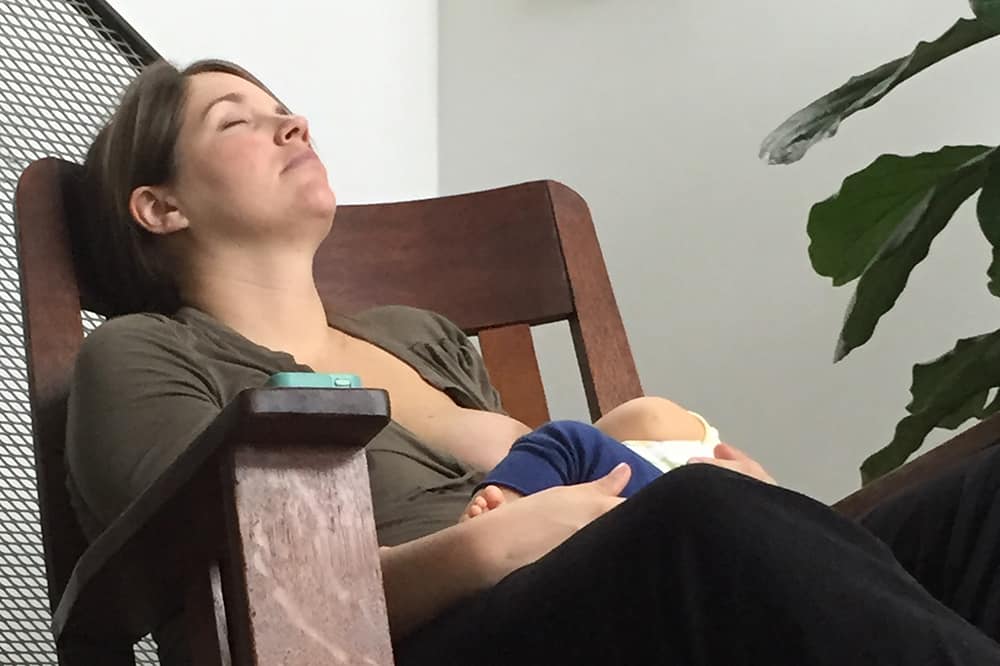
Mom Talk: Colic, Resentment, & Rage
Written by Holly Jean Pavonetti
Photography by Photo courtesy of Holly Jean
Today’s Mom Talk author, Holly Jean, is an environmentalist by trade who turned to writing when the colic of her first born brought her to the brink of collapse. Writing became the buoy she clung to for self-recognition and resulted in her memoir 17 & 17 Years: An International Journey of Finding Community and Coming Home. Below is an excerpt from her book that many fellow newborn moms (especially of babies with colic) can certainly relate to. “Colic was something I was drastically unprepared for,” says Holly. “I didn’t know where to turn for community—to ease the colic, to accept motherhood, or to understand the dynamic shift in my relationship with my husband given our circumstance. Eventually, I turned to writing for release.” Take in her words below, and read more of her work at believeinbecause.com
The lump in my throat was the size of a golf ball when I forced myself to confront him as he walked in the door, late. My husband’s original intention was to take a week off work after the delivery but once reality hit, he went back after three weekdays and a hard weekend.
“It’s 6:30.” My eyes were fully welled up with tears, but I tried to hide this raw emotion, so I turned to fiddle with diapers while I spoke. The golf ball in my throat was how it felt when I tried to hold in my real thoughts so I could create a productive conversation.
“I got caught up with something at the office.”
“Work ends at 6, right?” He ran his own business, so even giving validation to the 6pm late close felt graceful during my maternity leave.
“I’m sorry. I don’t know what to tell you.”
Every minute past six was a notch tighter on the medieval rack. I couldn’t bear the extra minutes, I wasn’t prepared for the extra minutes.
“Want me to go pick up dinner?” Hearing him ask felt mind-blowingly absent from my reality.
“No. I don’t want you to head out. You just got home.”
“God, I’m sorry.” His tone was not sorry. His tone was a mix of pressure, frustration, and annoyance. “Do you want to run out? We can order in.” I interpreted that to mean he didn’t want to be in the house even 15 minutes alone.
“Will you just hold him a minute? I have to sit down, I’m so sore.”
“Okay, let me just put my coat down and go to the bathroom real fast.” He saw me collapsing. His reaction made it seem like I was being unjust to a normal expectation. To me, it was a normal expectation, to work late, to put down your coat, to go to the bathroom. They were normal expectations in normal circumstances, but these times were exceptional.
Fuck you, going to the bathroom. He’s screaming on my lap while I sit on the toilet. And I am mopping up blood and cleaning stitches when I go. I don’t get a “let me just” for a 9 hour day. But I didn’t say it. He was finally home. I was already overstepping my usual dialog by making it blatant that 6:30 was too late. Practice taught me to take one thing at a time, and I didn’t have the capacity for more. I didn’t want to face an argument. I was dealing with enough shit, I didn’t want it to hit the fan.
His bathroom break proved helpful for me to collect my thoughts. When he came back, I reiterated my point. “I know work is important. I know your business is just getting started, but if you leave work at 6 you should be home by 6:10. And if for some reason you really need to stay, I need you to tell me by six.” I was shaking. I wanted sympathy. I wanted understanding. But right now, I wanted change.
“I got it,” he said sharply.
To be fair, he tried to show up. He went in to work a few hours late for the first few weeks so that I could have some time to sleep after the long nights of feedings. He would take Jack downstairs after 7 and watch sports on the TV and I would rest until 9 or 10. It was enough to at least survive the day. There were also some fun times when he really showed up. Like when he would use Jack like a puppet and have him dance across our table, controlling his limbs and grooving to the tunes.
But overall, I was very alone. I felt like it was up to me the way he hoped it could be up to me, not because I wanted to, but because I didn’t feel like I had a choice.
That part of motherhood bootcamp, the divide in our relationship, was almost equally hard when I had the space to acknowledge it. At first, I felt like it was my responsibility to bring Jack to peace because I was the creator, the mother, the vessel. I was the food supply; we were connected internally, and there will always be a piece of him inside of me for the rest of my life. It felt like he was more mine and as a mother, I had a stronger superpower to make it better.
My strongest memory is when I was lying in bed one morning. My mother-in-law was downstairs watching Jack for a moment in a brave attempt to allow me some time to take a nap.
While she was downstairs doing her part to soothe him, I lay in bed and thought, If I don’t wake up, I’ll be okay.
It’s not that I wished to die, but that I had a beautiful life, and I would be okay if it were time to cash in my chips. I was tired. Beyond tired, I was exhausted, and there was no rejuvenation in sight. The birth literally tore me in half and now I had stitches deep within me, holding me together.
They discovered six weeks after the birth that I had been stitched up wrong. Like a sweatshirt whose zipper was only half aligned, they discovered this constant source of pain for me that I shrugged off and attributed to post-delivery pain. It made it impossible to sit down, not that Jack allowed it anyway.
When they discovered my raw, exposed tissue, they singed my tissue with liquid nitrate to kill my nerve endings, and even still, the raw sensitivity persisted. It was so physically and emotionally demanding that I didn’t think I had anything left. I was ready.
In similar moments, but with a hint more energy, I was driven to search for support: “Reasons for colic,” “food sensitivity,” “pain after childbirth,” “postpartum depression,” and “new parent coping.” I can’t remember all the browser history, but every moment I had off, I was searching for answers. Some searches I knew were terrible, but I typed them anyway. I searched for words like “frustrated,” “helpless,” and “giving up.” It didn’t matter the search, I rarely found anything of substance, but I did come upon a quote by Miranda July that made me cry because of how fitting it is:
“If you were wise enough to know that this life would consist mostly of letting go of things you wanted, then why not get good at the letting go, rather than the trying to have?” These exotic revelations bubbled up involuntarily and I began to understand that the sleeplessness and vigilance and constant feedings were a form of brainwashing, a process by which my old self was being molded, slowly but with a steady force, into a new shape: a mother. It hurt. I tried to be conscious while it happened, like watching my own surgery. I hoped to retain a tiny corner of the old me, just enough to warn other women with. But I knew this was unlikely; when the process was complete, I wouldn’t have anything left to complain with, it wouldn’t hurt anymore, I wouldn’t remember.
People would say that at three months it gets better. Some were bold enough to say six months, and then there were the heartless ones that said around a year. I was living on an hourly basis. Make it through this hour, and maybe the next could have relief.
We would do squats. We would drop our knees and hold him close and something about the motion would quiet his screams. Hundreds of squats, up and down all day. It turned into a method of evaluating how hard the night was. “Tonight was a 157-squat kind of night, tonight was only 86 squats.” It was the expectation that my husband would trade off with me when he could handle it. He wanted our roles to be balanced. He wanted to help, but regularly he couldn’t.
Each time I assumed more of the load than he did, he let me. I’d do the soothing for as long as I could bear, and my times went from double to triple his. And as I did more, I knew more, I was growing thicker skin and learning faster.
“Why is he crying?” He’d ask in desperation.
I never knew, but I had come to understand what we needed to try. “Did you check his diaper?”
“Yes, and I tried to feed him, but he won’t take a bottle.”
“He just ate 30 minutes ago.” I knew he saw me feed him, it felt dumbfounding. “Maybe rub his stomach, do his leg presses. Maybe he has gas.”
“What’s wrong with him?” he meant on a bigger scale.
“Nothing is wrong with him.” The question annoyed me. I had heard it too much and I was already done asking.
“Something is wrong with him.”
“He has colic. What else is there to say?”
“But why doesn’t it stop?” He pleaded. You can’t fix this, I wanted to scream. It just is!
Maybe that was the mother’s instinct, understanding faster. It took a long time, but eventually I became relatively accustomed to the screaming and soon, acceptance hit, I felt resentment that my husband couldn’t step up to the situation the way I had. I didn’t acknowledge my role, enabling the very situation I resented.
The craziest part was that by month four, I started to want another one. It wasn’t a conscious choice; it had to be biological. There wasn’t a single ounce of me that could handle another. I hadn’t even healed from the birth yet. But there was something in me that was ready. Something else that was growing. I loved him. Even though he never smiled, even though he couldn’t interact, even though the majority of his life was screaming or sleeping, it was enough. And even in my ugliness, there was still something more beautiful about life. That part of me that went through bootcamp was now strong. He was my everything. I had become a mom.
Are you a mother with something to say? Send us an email to be considered for our “Mom Talk” column.
Share this story




